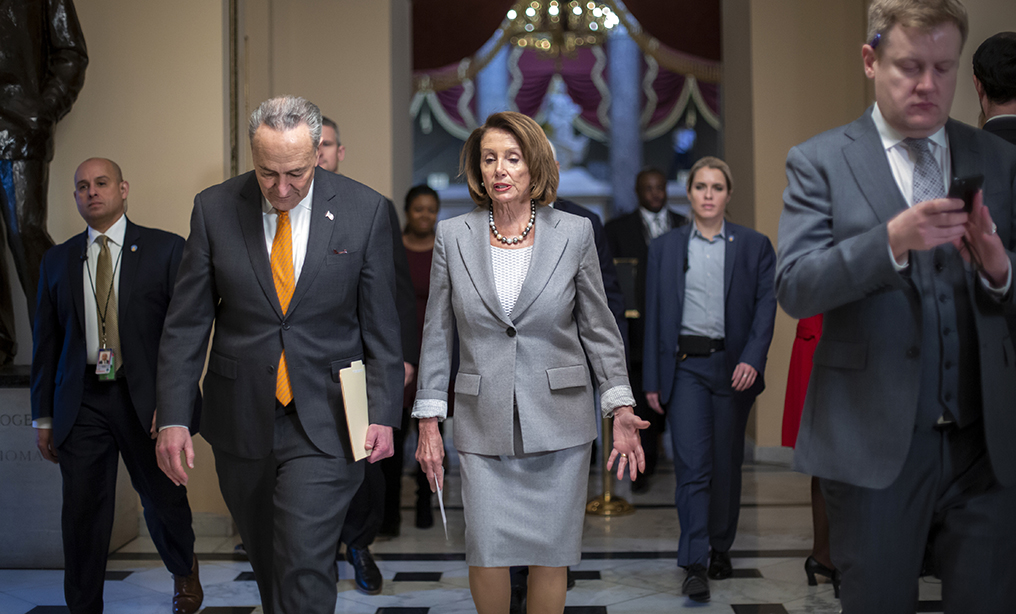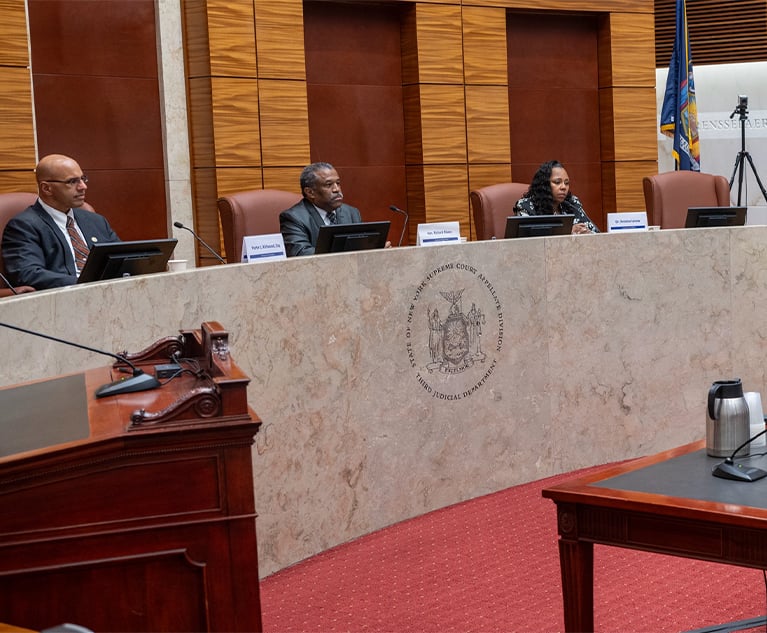NY Law Schools Fear That Government Shutdown Is Discouraging Public Service
"These shutdowns not just only undermine the public confidence but I also think it derails bright young law students from entering government service," said Rachel Pauley, who oversees D.C. externships for Columbia Law School.
January 09, 2019 at 04:22 PM
7 minute read
The original version of this story was published on Law.com
 House Speaker Nancy Pelosi, D-Calif., and Senate Minority Leader Chuck Schumer, D-N.Y., left, walk to meet with furloughed federal workers and discuss the impact on families from the partial government shutdown amid President Donald Trump's demands for funding a U.S.-Mexico border wall, on Capitol Hill in Washington, Jan. 9, 2019. (Photo: J. Scott Applewhite/AP)
House Speaker Nancy Pelosi, D-Calif., and Senate Minority Leader Chuck Schumer, D-N.Y., left, walk to meet with furloughed federal workers and discuss the impact on families from the partial government shutdown amid President Donald Trump's demands for funding a U.S.-Mexico border wall, on Capitol Hill in Washington, Jan. 9, 2019. (Photo: J. Scott Applewhite/AP)
Most New York law students who miss out on the opportunity to work for the federal government because of the shutdown will likely graduate on time but their advisers fear they will be turned off to public service altogether.
Hundreds of law students across the country who expected to extern this semester at federal agencies now find themselves in limbo. Their advisers are working frantically to find alternative placements but some students feel that the backup plans aren't as inspiring as their first choices.
 Columbia Law School
Columbia Law School“These shutdowns not just only undermine the public confidence but I also think it derails bright young law students from entering government service,” said Rachel Pauley, who oversees D.C. externships for Columbia Law School.
“I think it will be a real shame if students miss out on that experience. It upsets me horribly,” said William Yeomans, a former federal employee who teaches the Columbia students an ethics course leading into the externship. “I think what's going on is an exercise in irresponsibility. The government should never be shut down.”
This year, Columbia is opening the one-week course to students from the University of California system, the University of Georgia and the Roger Williams University School of Law. This will give the displaced students something meaningful to do while waiting to see if the federal government will reopen on time.
“As long as the federal courts are open, our students will be OK,” said Andrea Mooney who supervises Cornell Law School's externships. “If the courts close, that will be a problem. The other students who are doing externships are working with NGOs, or with local NYS courts and government offices, so they will not be affected.”
Eduardo Peñalver, Cornell Law School dean, was hopeful that the students will persevere in their pursuit of public service. “I would wager that it will take more than a government shutdown – even a long one – to deter them from pursuing their chosen career path,” he said.
Melinda Saran, vice dean for social justice initiatives at the University at Buffalo School of Law, said one student who has an externship planned at the U.S. Attorney's Office is likely to be affected. Even if the government does open, it's not clear if the student will be able to report for work because the paperwork for a security clearance won't be processed during the shutdown.
Nevertheless, Saran wonders if the shutdown might in part be inspiring to students. “They see the US Attorneys still working, even without pay, to promote justice and meet their ethical duties,” she said.
Across the nation, some students are waiting to see whether their agencies reopen or return to full operations in time to collect academic credit for the spring semester, while others are rushing to non-governmental agencies, or federal agencies that aren't affected by the shutdown, line up alternate externships at nonprofits and according to externship coordinators at law schools that send students to the nation's capital to gain real-world experience.
“Just like the rest of the country, the shutdown has caused confusion, anxiety, and a lot of disappointment,” said Jessica Tillipman, assistant dean for field placement at George Washington University Law School. “The students have been planning for a semester to extern for credit. These are huge components on their resumes. To not know when they are going to start is concerning.”
Between 50 and 60 George Washington students are feeling the impact of the shutdown, which represents about half of the school's spring semester externs, Tillipman said. Externs in the federal judiciary are still on track to work, but that could change if the courts' funding runs out in the coming weeks, she added.
Law schools thus far are facing few other consequences of the shutdown beyond the uncertainty over government externships. They aren't directly funded by the government, and the shutdown has not yet affected the federal student loan program, which is the single largest source of funding for law campuses. Law schools receive the occasional federal grant, but those awards tend to be long-term and insulated from temporary shutdowns.
The one exception is the University of the District of Columbia David A. Clarke School of Law, the only public law school in Washington, where the federal government controls local government spending. But the school has remained fully funded and open thanks to an exemption granted to the District of Columbia through the Office of Management and Budget. It has largely been business as usual, according to interim Dean John Brittain.
Even so, the school surveyed students, faculty and staff Tuesday to find out how many people have family members furloughed under the shutdown, which might impact their financial circumstances.
“We want to express empathy, and find any other way we can accommodate them during this shutdown period,” Brittain said.
This isn't the first time law schools have needed to help externs during a government shutdown. Large swathes of the federal government shuttered for 17 days in October 2013 amid congressional disagreement over the budget. The timing of the current shutdown was less of a problem for law schools because it began during the holiday break instead of the middle of the semester. That situation made it easier for students to change direction and take classes instead or line up a different externship before it got too far into the spring semester. Still, law school administrators say this shutdown is more worrisome than in 2013.
“We've had externships delayed in the past due to shutdowns, but this is more extreme,” said Julia Fromholz, director of the international rule of law and security program at the Arizona State University Sandra Day O'Connor College of Law who also oversees the school's Washington program. “This is more stressful for everyone because it's so uncertain.”
Many of the law schools are tapping their alumni networks to find other placements for the students.
“Because the end of the shutdown is difficult to predict, we are reaching out to our large alumni base in Washington, particularly those alums working for committees on the Hill, nonprofits and those agencies unaffected by the shutdown,” said Jessica Heywood, who runs Georgia's program.
Others are concerned that a continued shutdown could also sour some students from pursuing careers in the government.
“We have a lot of students who want to go work for the government,” said Tillipman of George Washington University Law School. “You never want to see a law student discouraged from that by seeing lawyers who are getting shut out of work without a paycheck.”
This content has been archived. It is available through our partners, LexisNexis® and Bloomberg Law.
To view this content, please continue to their sites.
Not a Lexis Subscriber?
Subscribe Now
Not a Bloomberg Law Subscriber?
Subscribe Now
NOT FOR REPRINT
© 2025 ALM Global, LLC, All Rights Reserved. Request academic re-use from www.copyright.com. All other uses, submit a request to [email protected]. For more information visit Asset & Logo Licensing.
You Might Like
View All

Law Firms Expand Scope of Immigration Expertise Amid Blitz of Trump Orders
6 minute read
'Reluctant to Trust'?: NY Courts Continue to Grapple With Complexities of Jury Diversity
Trending Stories
- 1Uber Files RICO Suit Against Plaintiff-Side Firms Alleging Fraudulent Injury Claims
- 2The Law Firm Disrupted: Scrutinizing the Elephant More Than the Mouse
- 3Inherent Diminished Value Damages Unavailable to 3rd-Party Claimants, Court Says
- 4Pa. Defense Firm Sued by Client Over Ex-Eagles Player's $43.5M Med Mal Win
- 5Losses Mount at Morris Manning, but Departing Ex-Chair Stays Bullish About His Old Firm's Future
Who Got The Work
J. Brugh Lower of Gibbons has entered an appearance for industrial equipment supplier Devco Corporation in a pending trademark infringement lawsuit. The suit, accusing the defendant of selling knock-off Graco products, was filed Dec. 18 in New Jersey District Court by Rivkin Radler on behalf of Graco Inc. and Graco Minnesota. The case, assigned to U.S. District Judge Zahid N. Quraishi, is 3:24-cv-11294, Graco Inc. et al v. Devco Corporation.
Who Got The Work
Rebecca Maller-Stein and Kent A. Yalowitz of Arnold & Porter Kaye Scholer have entered their appearances for Hanaco Venture Capital and its executives, Lior Prosor and David Frankel, in a pending securities lawsuit. The action, filed on Dec. 24 in New York Southern District Court by Zell, Aron & Co. on behalf of Goldeneye Advisors, accuses the defendants of negligently and fraudulently managing the plaintiff's $1 million investment. The case, assigned to U.S. District Judge Vernon S. Broderick, is 1:24-cv-09918, Goldeneye Advisors, LLC v. Hanaco Venture Capital, Ltd. et al.
Who Got The Work
Attorneys from A&O Shearman has stepped in as defense counsel for Toronto-Dominion Bank and other defendants in a pending securities class action. The suit, filed Dec. 11 in New York Southern District Court by Bleichmar Fonti & Auld, accuses the defendants of concealing the bank's 'pervasive' deficiencies in regards to its compliance with the Bank Secrecy Act and the quality of its anti-money laundering controls. The case, assigned to U.S. District Judge Arun Subramanian, is 1:24-cv-09445, Gonzalez v. The Toronto-Dominion Bank et al.
Who Got The Work
Crown Castle International, a Pennsylvania company providing shared communications infrastructure, has turned to Luke D. Wolf of Gordon Rees Scully Mansukhani to fend off a pending breach-of-contract lawsuit. The court action, filed Nov. 25 in Michigan Eastern District Court by Hooper Hathaway PC on behalf of The Town Residences LLC, accuses Crown Castle of failing to transfer approximately $30,000 in utility payments from T-Mobile in breach of a roof-top lease and assignment agreement. The case, assigned to U.S. District Judge Susan K. Declercq, is 2:24-cv-13131, The Town Residences LLC v. T-Mobile US, Inc. et al.
Who Got The Work
Wilfred P. Coronato and Daniel M. Schwartz of McCarter & English have stepped in as defense counsel to Electrolux Home Products Inc. in a pending product liability lawsuit. The court action, filed Nov. 26 in New York Eastern District Court by Poulos Lopiccolo PC and Nagel Rice LLP on behalf of David Stern, alleges that the defendant's refrigerators’ drawers and shelving repeatedly break and fall apart within months after purchase. The case, assigned to U.S. District Judge Joan M. Azrack, is 2:24-cv-08204, Stern v. Electrolux Home Products, Inc.
Featured Firms
Law Offices of Gary Martin Hays & Associates, P.C.
(470) 294-1674
Law Offices of Mark E. Salomone
(857) 444-6468
Smith & Hassler
(713) 739-1250







